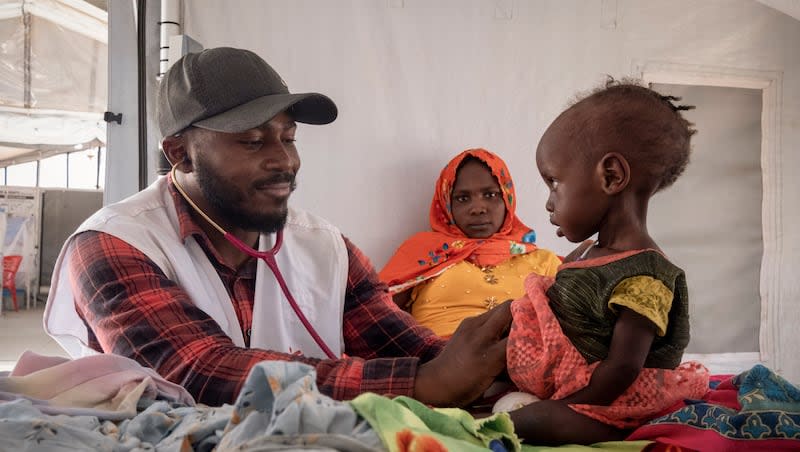Starving people in Sudan eating soil, leaves and peanut shells

Time is running out to prevent starvation in Sudan, warns the World Food Program.
Twenty-five million people in Sudan need humanitarian assistance, 18 million are facing acute food insecurity and 5 million people are at emergency levels approaching famine as the country’s civil war passes the one-year mark.
Amid so many other crises, the world’s largest hunger crisis is drawing little global attention. In the Al Lait refugee camp, for example, people are eating dirt and boiling leaves, just to have something in their bellies, reports Reuters. Others are eating grass and peanut shells, according to the World Food Program.
The in-depth report by Reuters interviewed over 160 civilians and more than 60 aid workers and food security experts in Sudan. One refugee reporters talked to is Garang Achien Akok. Akok, his wife and their five children had to abandon their home after Arab militiamen on camels stormed their village and torched their hut, he said.
Akok and his family have been in the Al Lait refugee camp since December but there is no work and very little food. They go two or three days without eating and then his family digs up dirt, rolls it into a ball and then washes it down with water. “I keep telling them not to do it, but it’s hunger,” he said. “There is nothing I can do.”
Human-made crisis
The civil war that erupted in April 2022 between the Sudanese army and the paramilitary Rapid Support Services has displaced more than 8.6 million people, according to UNHCR, the U.N. Refugee Agency. Agriculture has been ravaged, as crops have been destroyed or stolen, with farmers forced off their lands, or resorting to eating the seeds they were trying to save for planting. Militiamen destroyed solar panels used to power generators that helped draw water from deep wells.
One neighborhood near Omdurman came under siege at the beginning of the war by Rapid Support Services forces. Markets were destroyed. Electricity and the main water pipeline were cut off. Food was so scarce that people began hunting cats to eat. Women carrying food were searched at Rapid Support Services checkpoints, accused of supporting the army, beaten and sexually assaulted, reports Reuters.
Aid hubs have been looted by the Rapid Support Services and international aid has been blocked by the military. Aid workers in the country are at risk as well. Last Thursday, two International Committee of the Red Cross drivers were killed by gunmen in South Darfur, in an attack that left three other staff members injured, according to the humanitarian organization.
Doctors Without Borders, the only only large international organization providing free pediatric medical care across all five Darfur states, reported in February that the North Darfur health system and the entire humanitarian system has collapsed. There has been no food aid for a year. Conditions in a refugee camp in the area are “atrocious.” Claire Nicolet, head of Doctors Without Borders’ emergency response in Sudan, said: “What we are seeing in Zamzam camp is an absolutely catastrophic situation. We estimate that at least one child is dying every two hours in the camp.”
Those with severe malnutrition who have not yet died are at high risk of dying within three to six weeks if they do not get treatment, she added.
Michael Dunford, World Food Program’s regional director for Eastern Africa, said last week that “humanitarian access to conflict hotspots in Sudan has never been more critical.” The recent surge in violence in El Fasher is exacerbating critical humanitarian needs in Darfur, as people are forced to flee, some for the second or third time, and are becoming increasingly vulnerable. To compound the problem, Sudan is heading into the lean agricultural season as the rainy season approaches.
“In a world of plenty, children are starving to death,” said António Guterres, secretary-general of the United Nations, at the end of April.

